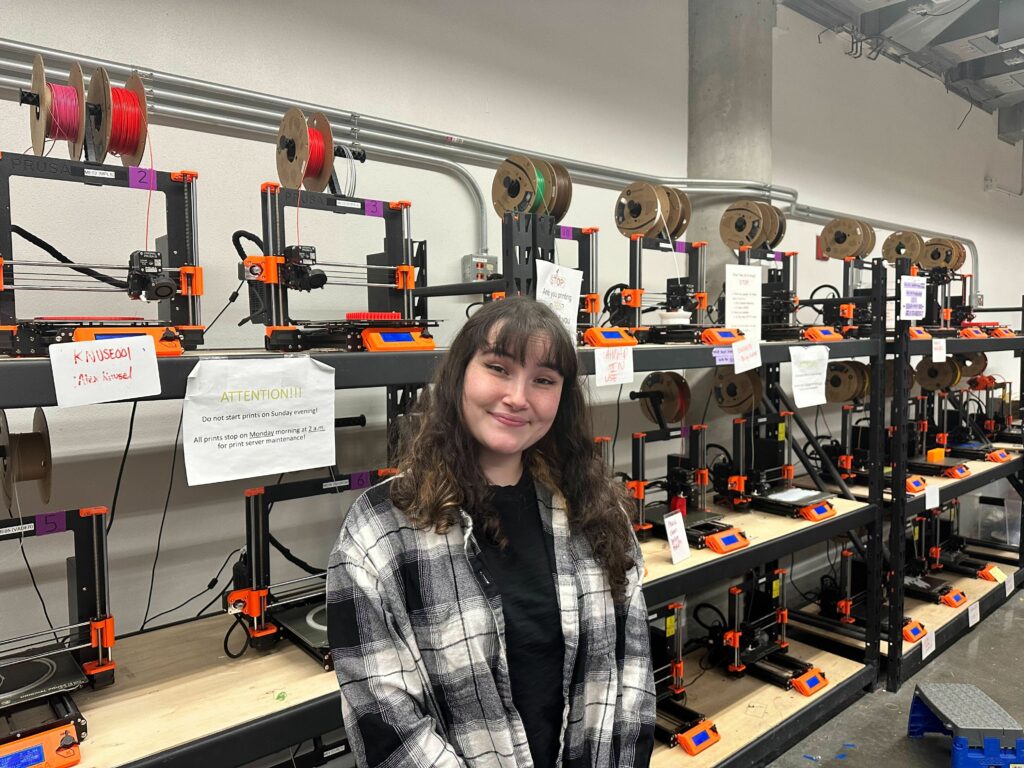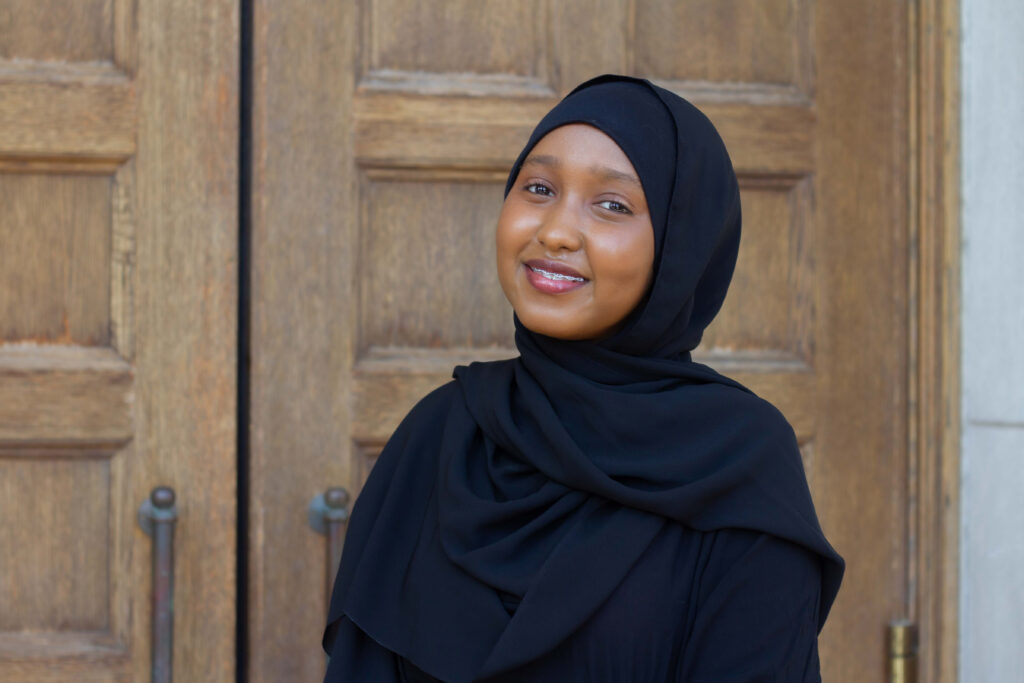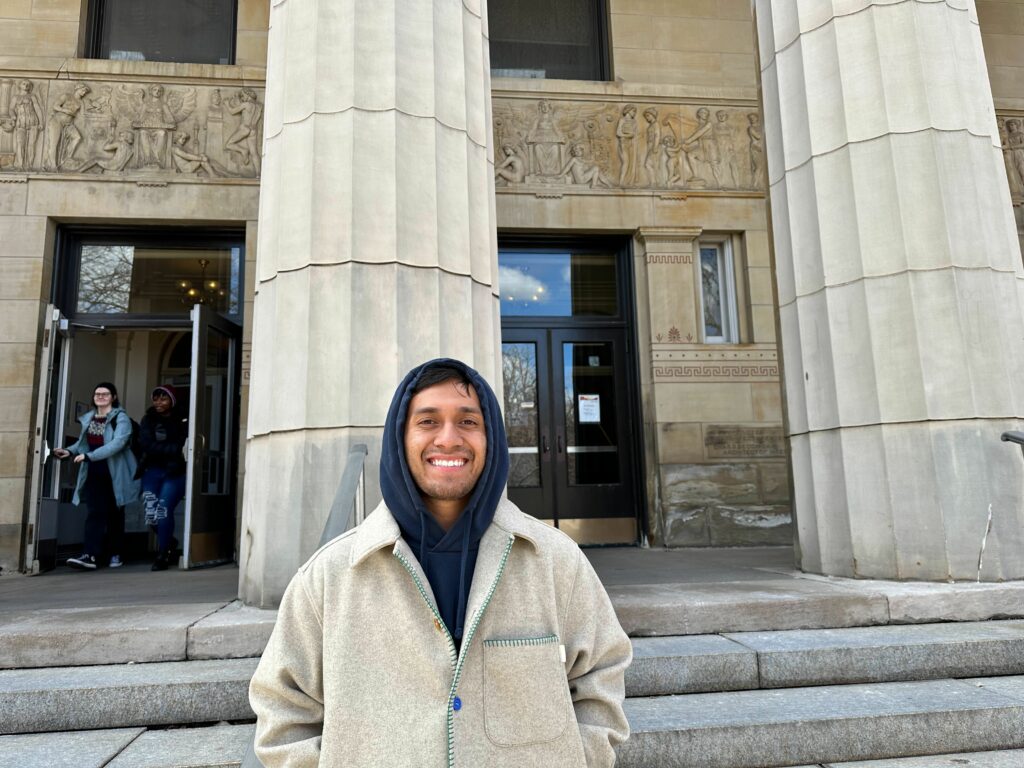First-gen undergraduates find passions and futures as Ronald E. McNair scholars
Three first-generation scholars tell their stories about how the research program shaped their career paths and helped them thrive at college
By Gabriel Castilho
For low-income, first-generation undergraduate students, especially those from underrepresented communities, a career in research is not always the first imagined pathway to the future.
But for the roughly two dozen students who are part of the university’s Ronald E. McNair Scholars program each year, the path becomes clearer. They are recipients of a federally funded research scholarship that prepares low-income, first-generation and underrepresented undergraduate students for graduate school.
In the summer of 2023, the scholarship funded 40 hours of research for 12 weeks for each recipient. The students were asked to contact a professor from their field of study to become their faculty mentor and supervise their research.
After finishing their research project, students traveled to Los Angeles to attend the Ronald E. McNair National Conference at the University of California, Los Angeles, where they presented their research.
Here’s a look at three of those scholarship recipients and how the McNair program changed their career trajectories:
From art dreams to electrical engineering

Jimena Jimenez, a first-generation electrical engineering student, describes her journey to where she is now as “a mess.”
“Honestly, when I came down to applications, my dream in middle school was to be an art major,” Jimenez said. “And then my mom and dad told me I can’t make money that way.”
When choosing which major to apply to, her parents’ opinions mattered a lot, she said. Since she was young, they always told her they wanted her to have a bachelor’s degree.
“They primed me for getting here and I don’t think they expected me to get this far,” she said.
According to Jimenez, when she saw how much money a mechanical engineer made, she made it her passion.
Jimenez’s first experience with electrical engineering came in 2022 through a summer internship her freshman year with Maverick Bioworks, a sustainable manufacturing company based in Oakland, California, where she worked on a robotic platform responsible for the handling of liquids in assembly and on wiring matters.
She said she did not know how electricity worked at that time.
“I asked for a textbook. I did some self-studying that summer,” Jimenez said. “Then halfway through the summer, I sent desperate emails to my adviser: I want to switch my major, how do I do that?”
Jimenez was featured in two articles from the College of Science and Engineering and won the 3M Impact Scholarship in 2021. She has also served on the University’s Cargill Thrive Student Advisory Board, a partnership between the University of Minnesota and Cargill to ensure more equitable access for women and Black, Indigenous and People of Color students pursuing careers in STEM, business and agriculture.
She became a Ronald E. McNair Scholar, undertaking research during the summer of 2023 with a project to investigate hardware alternatives to improve low-power machine learning applications.
Her days combine school with work, as she has a full-time job through CSE’s co-op program. Jimenez works as a quality engineer at Emerson Electric, a technology and software engineering company, developing pressure, temperature and level sensors. This summer, Jimenez plans to intern at Marvell Technology, a Delaware-based data infrastructure company, before she returns to Emerson in the fall as a wireless design engineer.
In addition to her full-time job, she is working with the Society of Hispanic Professional Engineers to create workshops for high school students.
“One positive of being a first-generation student, you have no idea what the possibilities are like, and it really inspired me to do everything,” Jimenez said.
She plans to pursue a master’s degree and eventually a Ph.D., but said that if she fell in love with the technical field, she would pursue a career in the industry. She could also go back to her start-up roots and open her own makerspace, which is a collaborative work space for making, learning, exploring and sharing ideas.
“I feel like I don’t have anything holding me down,” Jimenez said.
Mental health around the globe

Fatuma Arab, a first-generation psychology student, arrived at the university with plans to become a medical doctor.
“Back in my home country, I never knew there was something called psychology,” Arab said. “I came to live in the United States and I still did not know much about psychology.”
It took less than a year for her to discover that medicine was not her passion.
“In my culture, you either become a doctor or engineer or computer scientist,” Arab said. “When I had this realization that I did not want to become a doctor, I had a meltdown. I was like, ’What now?’”
Arab’s experience with the McNair program last summer confirmed her real passion: applying her research in the clinical field of psychology. With the McNair opportunity, she designed a participatory model that integrated well-being and climate leadership with Somali American youth. It was the first time she had ever done research.
“When I knew I wanted to do psychology, I knew I wanted it about immigrant mental health,” Arab said. “I knew I wanted to do East African immigrant mental health … from there on, it was the program process that helped me set up my research topic.”
Through the McNair program, Arab said she gained important academic habits she would otherwise have not developed.
“Finding opportunities by yourself is very hard, but in the McNair program, they hand you the resources,” Arab said. “So now, I can go and find opportunities on my own.”
She first heard about the Ronald E. McNair scholarship through her graduate mentor when she was part of a student organization. Her research project was inspired by her goal to create a foundation in the United States for the Somali community due to the lack of mental health initiatives within the community. Now, Arab wants to travel the globe to apply her research to mental health clinics in Europe, Kenya and Somalia.
“There’s so many mental health practitioners here,” Arab said. “I want to go back to Somalia, and that is my biggest goal, but before we can even talk about mental health we have to address the other issues. So I hope the foundation is set.”
Arab said a defining feature of her experience with the McNair scholarship was her relationship with her faculty mentor, a Somali psychotherapist with expertise in refugees, immigrant trauma and resilience, who is a refugee herself. The relationship helped her gain networking skills and know more about the academic community.
“I knew I really wanted to work with this lady because she represents me and my people, and she represents my values,” Arab said.
She describes her first-generation university student experience as “being the first to experience everything” in her family — the first to go to college and to finish high school. She also says it is about being a role model for her family.
Arab works as a youth program coordinator for the Beautywell organization, a public health and leadership project targeting East African young women, where she does presentations on health and leadership.
“I would not have the confidence to approach this kind of opportunity if it wasn’t for the skills that I gained from McNair,” Arab said. “Public speaking, doing presentations, recruiting and just finding someone to connect with — it kind of helped set the foundation for my future.”
Cultural identities in the workplace

Edgar Gonzales Reyes, a first-generation human resource development student, went through several major life changes before becoming a McNair scholar.
He grew up as a low-income student with immigrant parents and joined the National Guard to help his family financially.
In his freshman year, he was deployed to Guantánamo Bay, Cuba. Because of this, he took a gap year in 2019 and resumed his studies in late 2020. He had joined the university as a kinesiology major, but he was not certain about his future in this area.
“When I got back from my deployment, I was completely lost,” Gonzales Reyes said. “I went to CAPE.”
The Center for Academic Planning and Exploration is a university-wide academic transition support system. It was there that Gonzales Reyes first heard about the human resource development major in 2021.
“I came in as a kinesiology student because I love to work out,” he said. “I am doing the same thing now, just not the physical aspect. I did this transition from the physical to the mental aspect when it comes to people.”
Gonzales Reyes said in 2021 he did not particularly care about going to graduate school and did not think of doing academic research. It all changed when he heard one of his fraternity roommates talk about the Ronald E. McNair program.
“At some point, I was like, ‘You know what? I will give it a try,’” Gonzales Reyes said. “I applied to the program and got in.”
Through his McNair experience, Gonzales Reyes could conduct his own research project for the first time. There, he designed a way to measure how employee resource groups — workplace groups where professionals come together and help each other out — could help workers who identified as Black, Indigenous and people of color.
“We were really interested in how we can apply our cultural identities into our workplace without having to adapt to white culture, basically,” he said. “We almost had it applied to Land O’Lakes … but that fell through because of time and budget constraints. We are still trying to figure out how it can apply to an actual organization.”
The program helped him understand more about himself and his career goals, he said. Most importantly, it made him realize if he wanted something, he could achieve it.
“It made me realize I was not applying myself as much as I should have. I was not using my full potential,” Gonzales Reyes said.
Gonzales Reyes now works as a hiring officer in his international Latino-based fraternity, Sigma Lambda Beta, and as a human resources intern at the Minnesota Department of Transportation’s Seeds student worker program, helping minority college students get jobs in the government.
“This is a really cool premise because it is just like McNair,” he said. “They help people get into graduate school, we help people get work in the government. It is a mirror image of each program, just from different angles.”

